
Common name:Ribbonleaf Japanese Maple
Botanical name:Acer palmatum 'Atropurpureum'
This Japanese Maple grows as a small, deciduous tree complete with palmate leaves that turn red and endure for the entire season.

Common name:Red Fringe Flower
Botanical name:Loropetalum chinese 'Rubrum'
Red Fringe Flower is a 6-12' shrub with arching branches and light green and reddish leaves .

Common name:Lavender Lady English Lavender
Botanical name:Lavandula angustifolia 'Lavender Lady'
A well-developed woody base is apparent with this evergreen subshrub. Its leaves assume an obtuse form, and have a grey-green color above and a white tomentose shade below. It needs little water, full sun, and well drained soils. Strong lavender scent for perfumes and sachets.

Common name:New Zealand Flax
Botanical name:Phormium tenax
New Zealand Flax is a large, bold plant with stiffly vertical, sword-like, green leaves that arise from its base. It should be grown under full sun for best color. Varieties will offer different growth habits and leaf color.

Common name:Dwarf Heavenly Bamboo
Botanical name:Nandina domestica 'Compacta'
The dwarf heavenly bamboo is an evergreen shrub that grows 4-5 ft. high. It has green and bronze foliage that turns red in the winter. It is resistant to oak root fungus and hardy to 10 degrees F. The dwarf heavenly bamboo is native to California and is drought tolerant. -Cornflower Farms
Are pests bugging you? If pests are taking over there might be a good reason! Instead of grabbing that bottle of spray, consider using techniques that can solve your pest problems without toxic pesticides.
Click in the green box for more information
Designer:
Photographer: GardenSoft
Practice grass-cycling by leaving short grass clippings on lawns after mowing, so that nutrients and organic matter are returned to the soil.
Mulching and adding compost to soil can minimize evaporation and help soil absorb and store water.
Attract, or buy beneficial insects such as ladybugs and lacewings to control pest outbreaks in your garden.